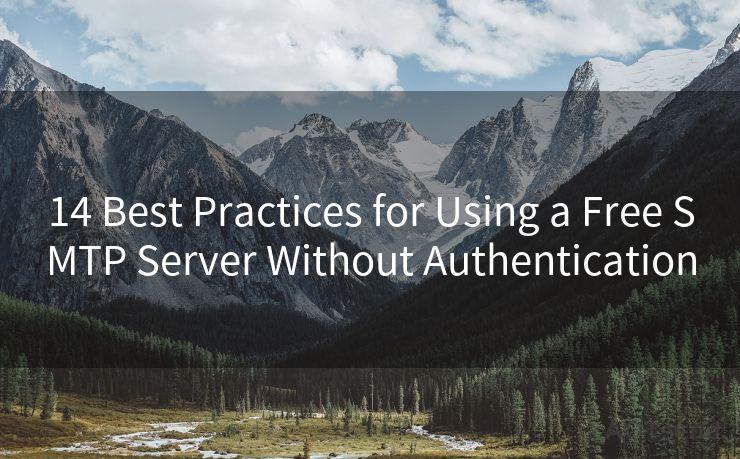14 Best Practices for Using a Free SMTP Server Without Authentication




When it comes to using a free SMTP (Simple Mail Transfer Protocol) server without authentication, there are several best practices to keep in mind. These practices ensure smooth and secure email delivery while minimizing the risks associated with unauthenticated SMTP servers. Here are the top 14 tips to guide you:
1. Understand the Risks
Before using an unauthenticated SMTP server, it's crucial to understand the potential risks. Such servers can be prone to spam and abuse, so it's important to take precautions.

2. Choose a Reliable Provider
Select a well-known and trusted SMTP server provider. Research their reputation and read reviews to ensure they are reliable and secure.
3. Configure Your Email Client Correctly
Properly set up your email client to use the SMTP server. This includes entering the correct server address, port number, and any other required settings.
4. Monitor Email Delivery
Regularly check the delivery status of your emails. Look for bounce messages or other delivery failures that might indicate a problem with the SMTP server or your email configuration.
5. Avoid Sending Spam
Respect the CAN-SPAM Act and other anti-spam regulations. Avoid sending unsolicited emails, and always include a clear and conspicuous unsubscribe option in your marketing emails.
6. Protect Your Email Credentials
Even though the SMTP server doesn't require authentication, it's still important to keep your email credentials secure. Don't share your email address or password with unauthorized individuals.
7. Limit Email Volume
Don't flood the SMTP server with a large volume of emails in a short period. This can overload the server and cause delivery delays or failures.
8. Test Email Compatibility
Test your emails across multiple email clients and devices to ensure compatibility and readability.
9. Monitor Blacklisting
Regularly check if your IP address or domain has been blacklisted due to spam complaints or other reasons. Use blacklist monitoring tools to stay informed.
10. Follow Email Best Practices
Adhere to email best practices, such as using a clear and concise subject line, avoiding spammy words, and including a text version of your email along with the HTML version.
11. Optimize Email Content
Ensure your email content is engaging, relevant, and valuable to your recipients. This increases the chances of your emails being opened and read.
12. Handle Unsubscribes Gracefully
Provide a simple and effective way for recipients to unsubscribe from your emails. Respect their choice and remove them from your mailing list promptly.
13. Stay Updated on SMTP Server Changes
Keep yourself informed about any updates or changes to the SMTP server's policies or configuration. This helps you adapt your email sending practices accordingly.
14. Regularly Audit Your Email Practices
Periodically review your email sending practices to ensure compliance with regulations and best practices. This helps maintain a good sender reputation and improves email deliverability.
By following these 14 best practices for using a free SMTP server without authentication, you can minimize risks, improve email deliverability, and maintain a positive sender reputation. Remember, even though the server may not require authentication, it's still crucial to adhere to best practices and respect the privacy and preferences of your email recipients.




🔔🔔🔔
【AOTsend Email API】:AOTsend is a Managed Email Service for sending transactional emails. Support Email Types: reminders, authentication, confirmations, notifications, verification codes, invoices, password resets, account activations, billing statements, two-factor authentication (2FA), and one-time passwords (OTP) emails, etc. $0.28 per 1000 Emails. 99% Delivery, 98% Inbox Rate.
You might be interested in:
Why did we start the AOTsend project, Brand Story?
What is a Managed Email API, How it Works?
Best 25+ Email Marketing Platforms (Authority,Keywords&Traffic Comparison)
Best 24+ Email Marketing Service (Price, Pros&Cons Comparison)
Email APIs vs SMTP: How they Works, Any Difference?
Scan the QR code to access on your mobile device.
Copyright notice: This article is published by AotSend. Reproduction requires attribution.
Article Link:https://www.mailwot.com/p3876.html



